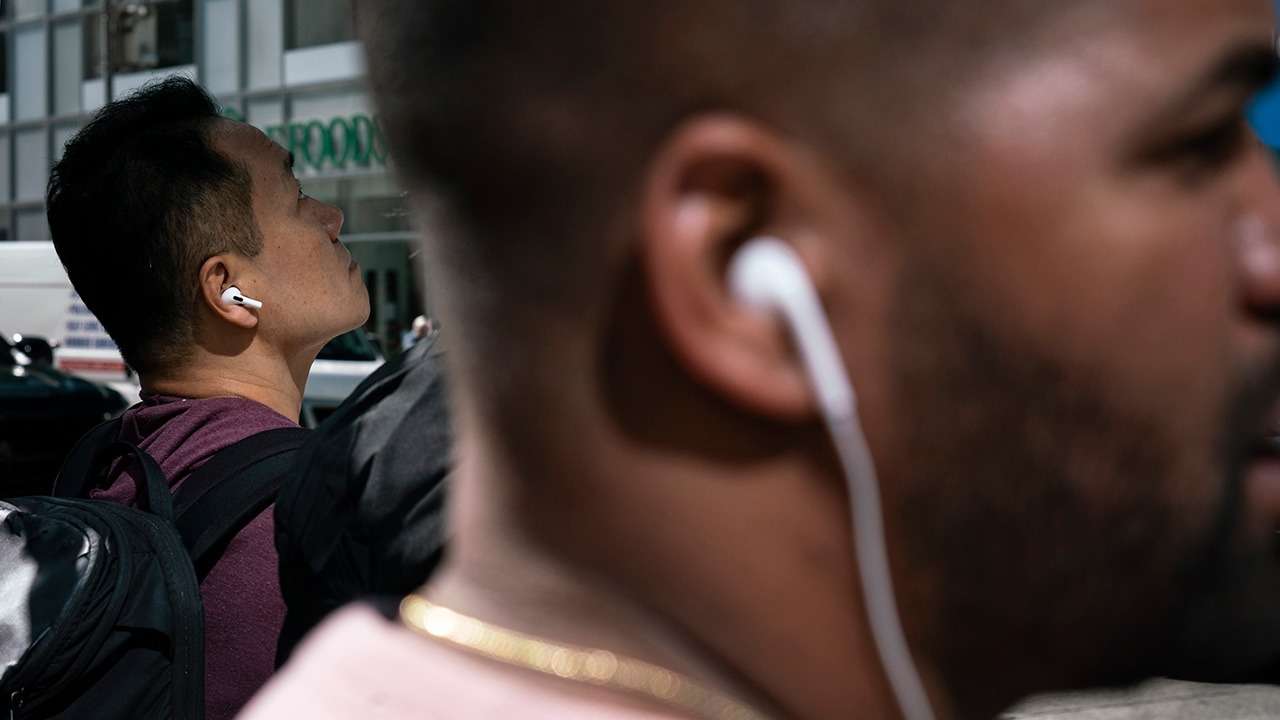
This study explores U.S. adults’ views of and experiences with podcasts as a part of the news and information landscape.
To examine the ways Americans get news and information in a digital age, Pew Research Center surveyed 5,132 U.S. adults from Dec. 5 to 11, 2022. Everyone who completed the survey is a member of the Center’s American Trends Panel (ATP), an online survey panel that is recruited through national, random sampling of residential addresses. This way nearly all U.S. adults have a chance of selection. The survey is weighted to be representative of the U.S. adult population by gender, race, ethnicity, partisan affiliation, education and other categories. Read more about the ATP’s methodology. Here are the questions used for this report, along with responses, and its methodology.
Pew Research Center is a subsidiary of The Pew Charitable Trusts, its primary funder. This is the latest report in Pew Research Center’s ongoing investigation of the state of news, information and journalism in the digital age, a research program funded by The Pew Charitable Trusts, with generous support from the John S. and James L. Knight Foundation.
Key takeaways
- Podcasts are popular: About half of Americans have listened to a podcast in the past year, and one-in-five of those listeners say they listen to a podcast nearly every day.
- Listeners turn to podcasts for entertainment, learning, and simply to have something to listen to while doing something else.
- Comedy, entertainment, and politics are at the top of the list of topics that podcast listeners say they regularly listen to.
- Most podcast listeners say they hear news discussed on podcasts – however, just one-in-five listeners say they listen to a podcast that’s connected to a news organization.
Following a steady increase in podcast listening over the past decade, podcasts have become a big part of the normal routine – and news diet – of many Americans, especially younger adults.
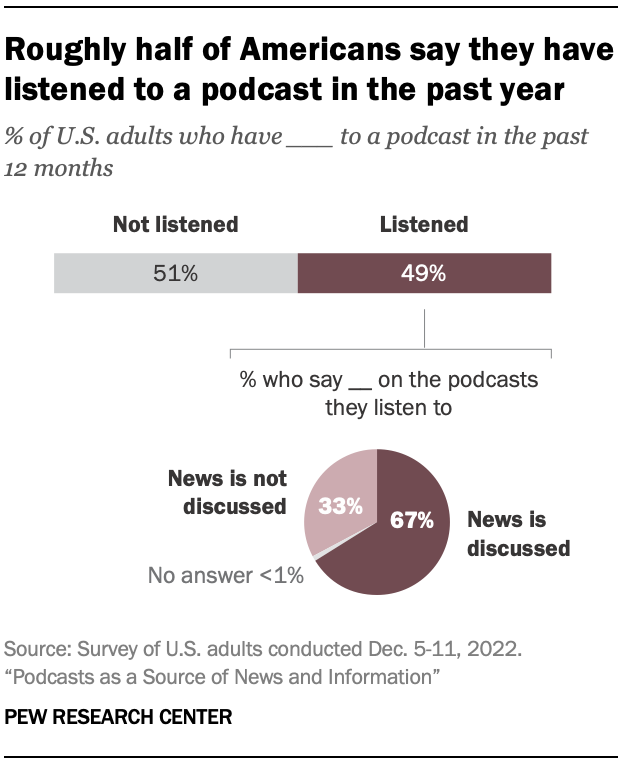
Roughly half of U.S. adults say they have listened to a podcast in the past year, according to a new Pew Research Center survey, including one-in-five who report listening to podcasts at least a few times a week. Among adults under 30, about a third listen to podcasts with such frequency.
Today’s podcast landscape is a sprawling one, featuring topics from sports and religion to politics and entertainment, and it attracts large numbers of listeners who turn to podcasts for a variety of reasons.
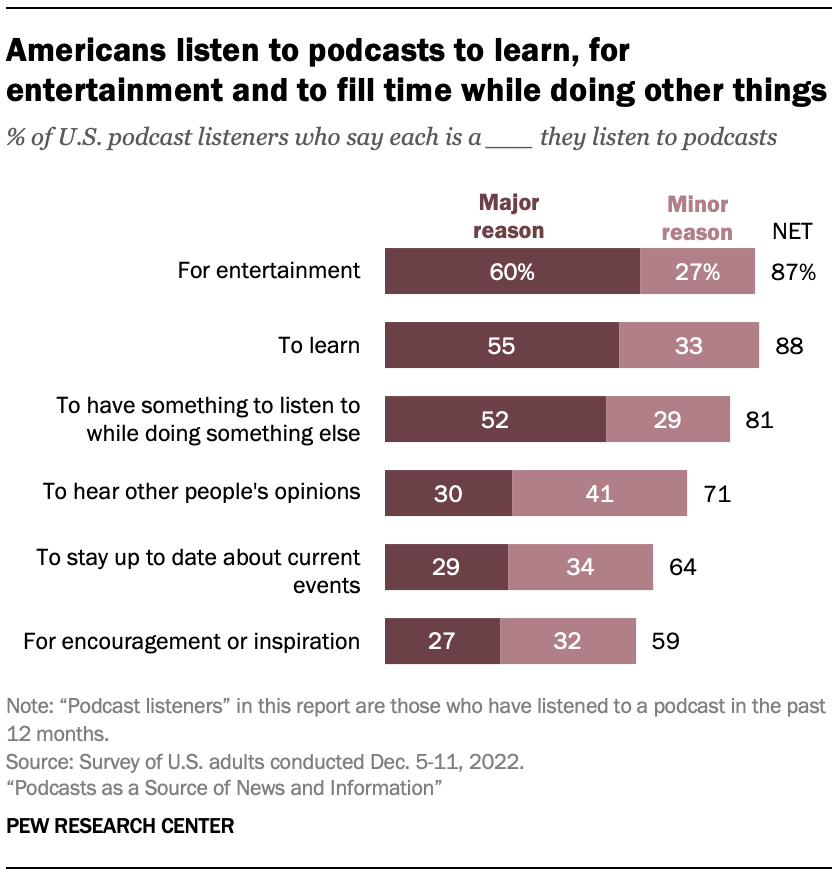
Large shares of podcast listeners say that they turn to podcasts for entertainment, learning and diversion – i.e., having something to listen to while doing something else. Half of Americans or more who have listened to a podcast in the past 12 months say these are major reasons they listen to podcasts.
Fewer Americans turn to podcasts in search of news, though most listeners still say that news is at least a part of their experience with podcasts. Among U.S. podcast listeners – those who have listened to a podcast in the past 12 months – 29% say that staying up to date about current events is a major reason they listen to podcasts. Two-thirds of podcast listeners say they have heard news discussed on the podcasts they listen to – amounting to a third of all U.S. adults. And among those who hear news on podcasts, the vast majority say they expect the news they hear there to be mostly accurate.
The rise of podcasts
Podcast listening in the U.S. has increased steadily since 2013. In 2014, the popular true-crime podcast Serial was released, becoming the fastest podcast to reach 5 million downloads on iTunes.
Years later, this was followed by investments into podcasts by platforms like Spotify, which paid at least $200 million for an exclusive deal with The Joe Rogan Experience in 2020.
However, even as podcast audiences continue to grow, some podcast hosts have been accused of spreading unsubstantiated false claims, and others have drawn backlash for offensive content.
The survey shows, however, that most podcast listeners are not tuning into podcasts connected to news organizations. Just one-in-five listeners say the podcasts they listen to are connected to a news organization, while almost three times that amount (59%) say they are not (21% aren’t sure).
Listeners turn to podcasts to hear about a wide range of specific topics. Nearly half of podcast listeners say they regularly listen to podcasts about comedy (47%) and entertainment, pop culture, and the arts (46%), while about four-in-ten (41%) turn to podcasts about politics and government. Other common topics include science and technology, history, and true crime (such as Serial, which helped popularize podcasts after its first season in 2014).
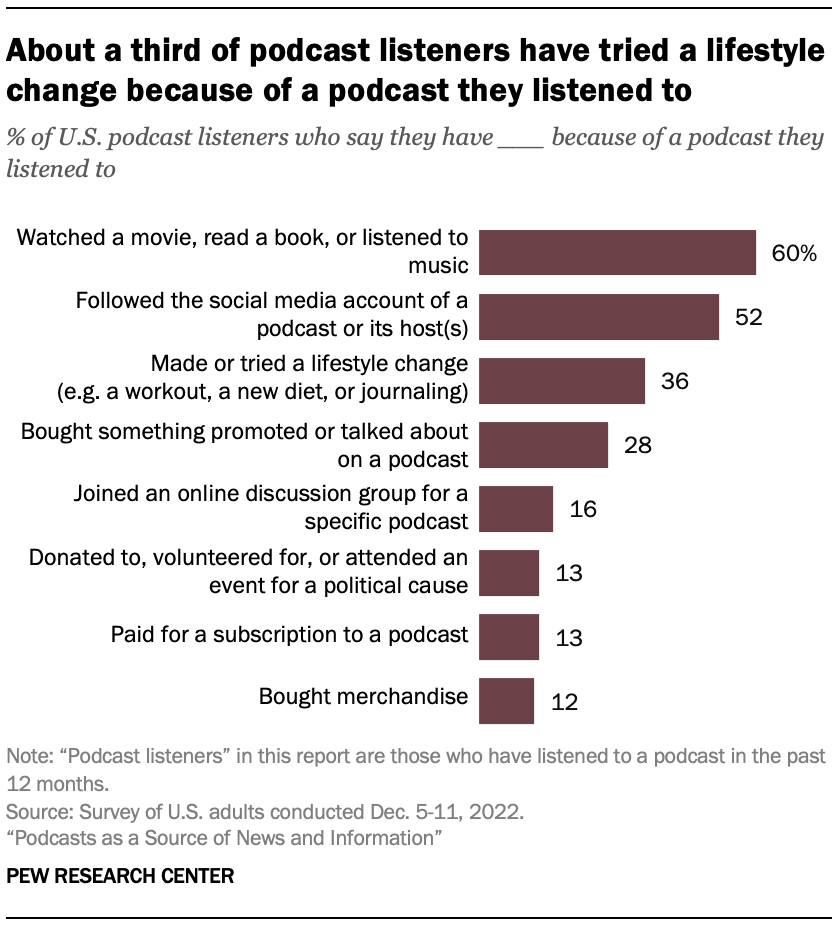
Many listeners also engage with podcasts in ways other than listening, such as watching a movie or reading a book because of a podcast, following a podcast or its hosts on social media, or purchasing a product that was advertised. About a third of listeners (36%) even say they’ve tried out a lifestyle change – such as a workout routine or journaling – because of a podcast they listened to.
Other types of engagement are less common, including joining online discussion groups, engaging with political causes, paying for a subscription or buying merchandise.
Nearly nine-in-ten of those who hear news on podcasts expect it to be accurate
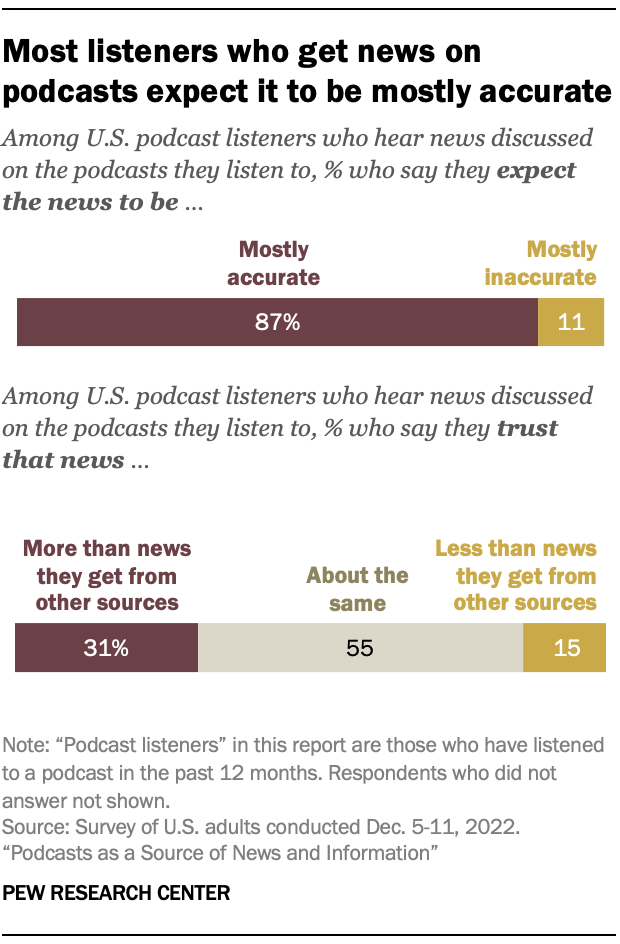
When Americans do hear about news on the podcasts they listen to, they largely view it as accurate. Among those who hear news discussed on podcasts, a large majority (87%) say they expect it to be mostly accurate, compared with about one-in-ten who say they expect it to be mostly inaccurate.
This is a much higher level of trust than people have in some other sources of news and information. For instance, in a slightly different question asked of Americans who get news from social media in 2020, 39% of social media news consumers said they expect the news they see there to be largely accurate, while a majority (59%) said they expect the news there to be largely inaccurate.
Similarly, most people who get news from podcasts either say they trust that news more than the news they get from other sources (31%) or trust it about the same (55%). Fewer (15%) trust news from podcasts less than news from other sources.
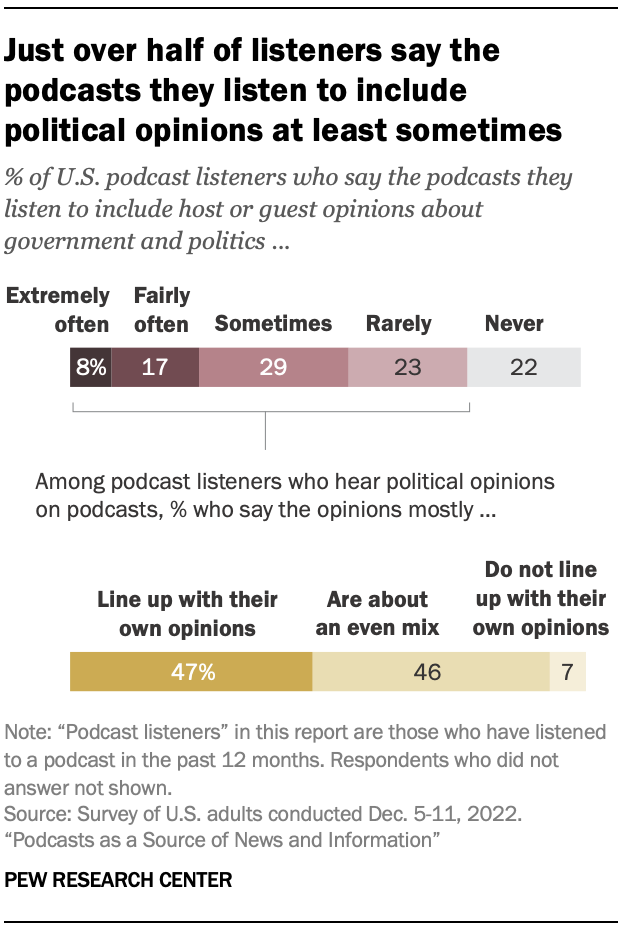
Many podcast listeners also say that the news they get there includes information they wouldn’t have heard about elsewhere. Nearly three-quarters of Americans who get news on podcasts (73%) say this happens at least sometimes, including three-in-ten who say they often hear unique news on podcasts.
Among all podcast listeners, just over half (54%) say they hear guest or host opinions about politics and government – including 25% who say they hear this type of content extremely or fairly often and 29% who hear it sometimes.
Many who listen to political opinions on podcasts say they largely agree with what they’re hearing. Among those who hear political commentary, about half (47%) say these views mostly line up with their own, while just 7% say the opposite. Still, almost half (46%) say they are exposed to about an even mix of political views.
Republican podcast listeners more likely than Democrats to trust podcast news and say it offers unique content
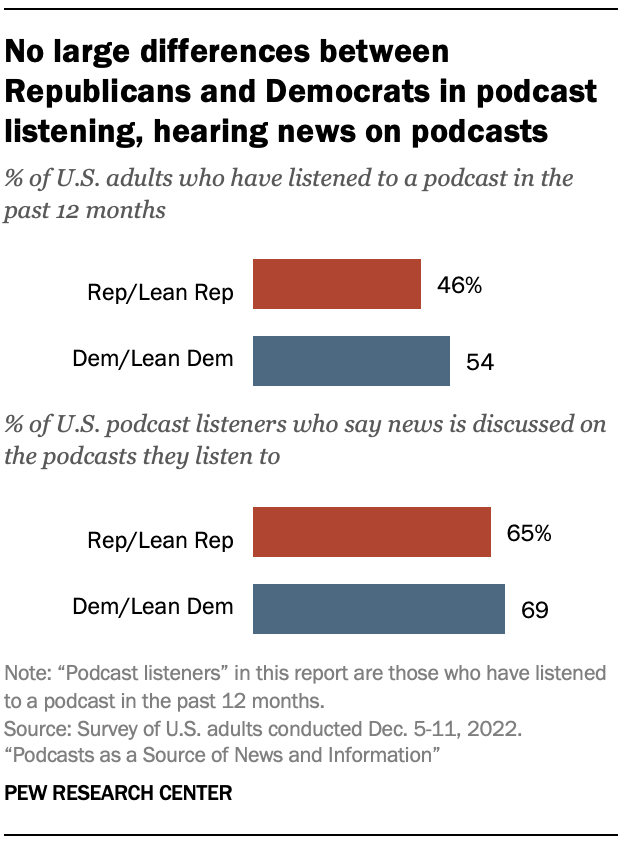
There are no huge differences between Republicans and Democrats in the shares who listen to podcasts and hear news on them. Just under half of Republicans and those who lean Republican (46%) and just over half of Democrats and Democratic leaners(54%) say they have listened to a podcast in the past year, and roughly two-thirds of listeners in each party say they’ve heard news discussed on the podcasts they listen to.
However, there are some notable differences between podcast listeners in the two major political parties when it comes to their views of the news they hear on podcasts: Republicans are more likely than Democrats to trust the news they hear on podcasts more than other sources and to report hearing news they wouldn’t have gotten elsewhere.
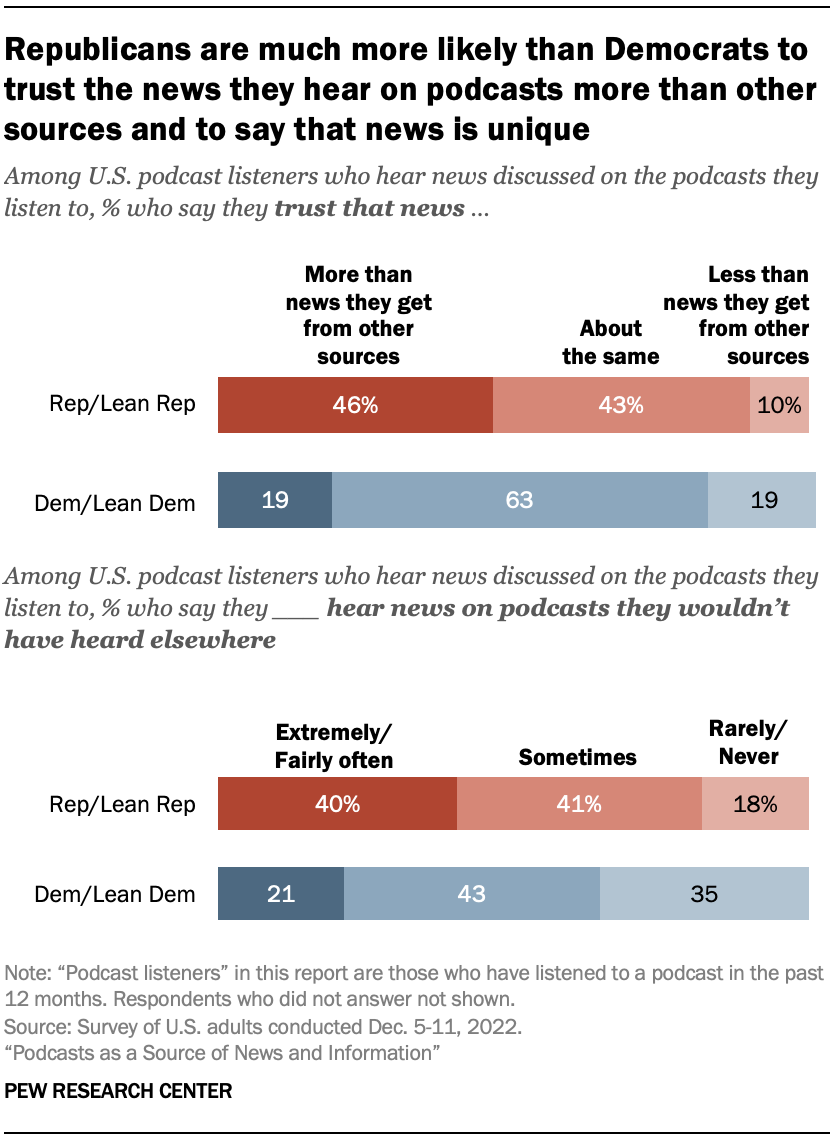
Among those who get news on podcasts, nearly half of Republicans (46%) say they trust news on podcasts more than news they get from other sources, compared with about one-in-five Democrats who feel this way (19%). And nearly twice as many Republicans (40%) as Democrats (21%) also say they have often heard news on podcasts that they would not have heard elsewhere.
Among podcast listeners overall, Republicans are somewhat more likely than Democrats to say they often listen to podcasts that feature political opinions (31% vs. 21%) and somewhat less likely to say they listen to podcasts connected to news organizations (14% vs. 26%).
Younger Americans more likely to listen to podcasts, and they turn to podcasts for different reasons than older listeners
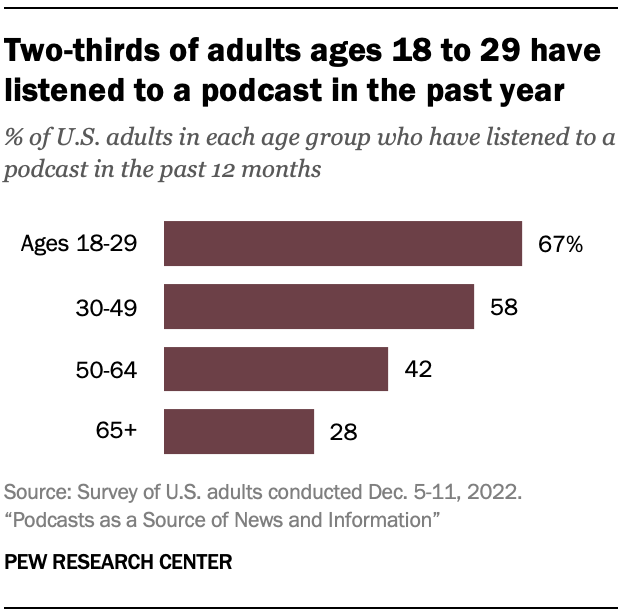
As is the case with many other digital habits, younger adults are more likely than older age groups to listen to podcasts – and by a wide margin. Two-thirds of Americans ages 18 to 29 have listened to a podcast in the past 12 months, compared with just under a third (28%) of those 65 and older.
Additionally, younger listeners tend to be more likely than older listeners to be listening to podcasts frequently. Among podcast listeners, roughly half (48%) of those in the youngest group say they listen at least a few times a week, versus about a quarter (27%) of those 65 and older. That means about a third of all U.S. adults under 30 (32%) report listening to podcasts at least a few times a week; the same is true of just 8% of those in the oldest group.
Younger and older podcast listeners are equally likely to say they hear news discussed on the podcasts they listen to. But because younger Americans are more likely to be listening to podcasts in the first place, overall they are more likely than older Americans to be exposed to news from podcasts.
The reasons that Americans turn to podcasts also differ by age. Most podcast listeners ages 18 to 29 say that entertainment (75%) or having something to listen to while doing something else (70%) are major reasons they listen to podcasts. A far smaller share of listeners 65 and older cite entertainment (30%) as a major reason they listen to podcasts, and even fewer (22%) listen to podcasts in the background while doing other things.
Meanwhile, the most common major reason podcast listeners 65 and older cite for listening to podcasts is learning (61%).




